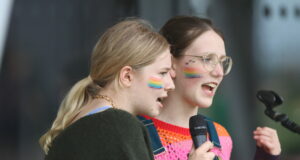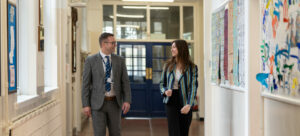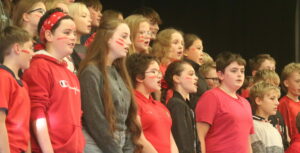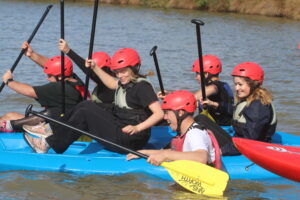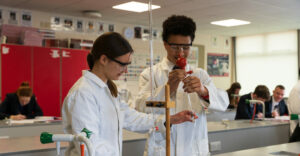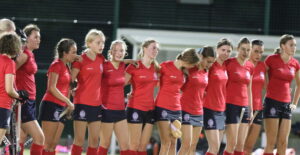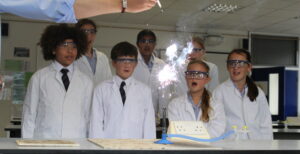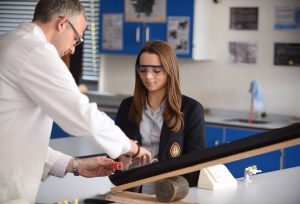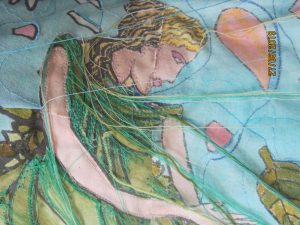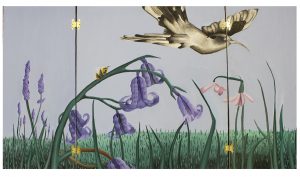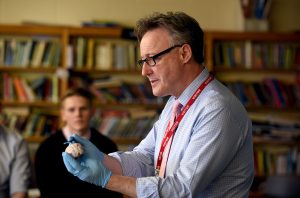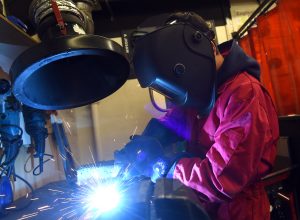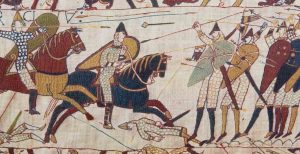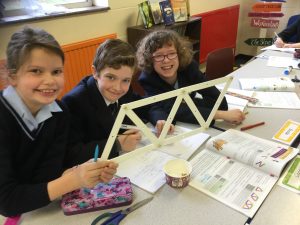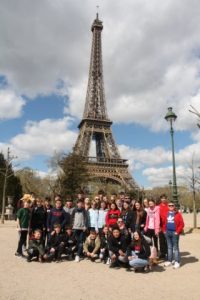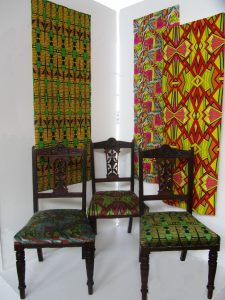Senior School Curriculum
Overview
The Senior School at Wisbech Grammar School provides pupils with a wealth of opportunities, both academically and via a range of co-curricular activities.
As an Independent School, we can go beyond the narrow confines of the curriculum and do not put a ceiling on learning by rigidly adhering to set specifications. Education is about finding an individual’s level – because every pupil is unique. At Wisbech Grammar School, we don’t ‘teach to the exam’ – rather we deepen a pupil’s understanding of a subject and enhance their learning by providing a positive and inspiring environment in which each child can thrive.
In the Lower School, pupils receive a broad education: English, Mathematics, History, Geography, French, German, Science, Music, Drama, Religious Studies, Art, Technology, Physical Education and Games. The General Science course followed in the first two years gives way to separate teaching of Physics, Chemistry and Biology from the 3rd Form.
In the Middle School, we offer 19 subjects at GCSE. Above core subjects such as English, Mathematics, a Modern Language, a Humanity and at least one Science, three other subjects are then chosen from: Art, Music, Drama, Design Technology, Food and Nutrition, ICT, Textiles, Physics, Chemistry, Biology, French, German, Spanish, PE, Religious Studies, History and Geography.
There are seven periods per day, Monday to Friday. Each period is 50 minutes in length; some of these are arranged in double periods, particularly in the GCSE and A-level years.
On Monday, Wednesday and Friday, Period 7 is given over to co-curricular activities. Pupils also have a timetabled PSHCE lesson.
More detailed information about the subjects available in the Senior School can be found on the following pages.
Alongside the extensive co-curricular programme, the academic opportunities in the Senior School at Wisbech Grammar School provide pupils with every opportunity to be successful and to become independent, well-rounded and well-qualified members of society. We look forward to working with them and supporting them on this important stage of their educational journey.
Subjects
Art
Art takes place predominantly in the large Girling Art Studio where pupils are encouraged to, and supported with, finding their particular creative strengths. Art and Textile Gallery includes images of all of the pupils work, showcasing their flair, creativity and talent.
There is also a screen printing room with equipment for photographic silk screen printing and a suite of Macs for Graphic and digital artists. Drawing is the basis but there are opportunities to discover painting, printmaking, 3D work, collage or photography and digital graphics.
As pupils move up the school they have more freedom to choose their own topic, but everyone is welcome to attend a range of clubs, from Animation to Art History. The work produced by pupils is displayed around the school and there are opportunities to showcase work in exhibitions each academic year.
Visits to major Art galleries are part of the GCSE course and other trips are organised. Excursions abroad include Barcelona and New York.
Biology
“Biology is the study of the complex things in the Universe. Physics is the study of the simple ones.” R. Dawkins
Biology is the study of life; it helps us to understand the world in which we live and reminds us about our interconnectedness with other living things.
At Wisbech Grammar School, we aim to inspire a fascination with the natural world in all our pupils and encourage them to learn about the central role of Biology in our lives.
The Biology Department is vibrant and well-resourced with four experienced, enthusiastic Biologists who combine exciting teaching methods and academic rigour to teach.
Practical Biology lies at the heart of our teaching: 4th and 5th Form pupils investigate numerous molecular mechanisms and dissect a variety of organisms. In 3rd to 6th Forms, there are opportunities to study for the CREST Awards at Bronze, Silver and Gold levels, as well as the Biology Challenge in the 4th Form.
There is a thriving fortnightly Biology Discussion Group that maintains its own independent blog and podcasts its meetings.
Chemistry
Chemistry is universally considered as the “central science”. Research in ground-breaking areas such as genetics, medicine, materials science, forensics, nanotechnology, drug discovery, and fulfilling the future energy demands of the planet are all driven by chemistry.
The GCSE course builds upon the concepts studied in the 3rd Form. However, Chemistry splits into three distinct disciplines – organic, inorganic and physical. As the course progresses, links between the three disciplines will develop and allow a more thorough understanding of the subject as a whole.
The theory is supported by essential practical work that reinforces the concepts covered during lessons and develops vital skills that include the competent use of equipment, collecting and analysing data, and the drawing of conclusions.
The course can be challenging at times, but extremely rewarding. If approached with the correct work ethic, the subject becomes easier as the course progresses when key concepts are revisited and links are made across the disciplines.
Design and Technology
Design Technology enables pupils to become more resourceful, innovative, enterprising and design capable. Students develop a critical understanding of the impact of design and technology on daily life and the wider world. Additionally, it provides excellent opportunities for students to develop and apply value judgements of an aesthetic, economic, moral, social, and technical nature both in their own designing and when evaluating the work of others.
The Design Technology Department at WGS well-resourced with a design studio, 2 dedicated workshops, a 3D printer and CAM Lasercutter, two enthusiastic technologist who work with the pupils in design led and practical workshop based activities.
Practical application of principles learn in Science and Maths lie at the heart of our what the department teachers pupils to allow them to be active members of a rapidly changing technological world. Years 1 and 2 work on a carousel system along with the rest of the creative subjects and then pupils opt to continue with their technology education from the 3rd year onwards.
We follow the AQA GCSE specification in the 4th and 5th year and the EDEXCEL A LEVEL specification in the Sixth form. Both levels involve pupils investigating real life topical problems and solving them through the realisation of a practical product.
Pupils who have studied GCSE and A Level DT progress onto careers in many disciplines. The subject is a common combination with Maths and Physics for mechanical engineering students at University, with Art and another subject for Architecture, and with any other A Level combination for studying Product Design or entering a range of higher level apprenticeships.
The department offers a wealth of extracurricular activities which include Young Engineers club and open workshop during the period 5 co-curricular period during the school day. Also, after schools on a Tuesday there is another Young Engineers club where pupils build, race and maintain two buggies and radio controlled cars. For examination classes there is a revision session on a Thursday after school throughout the year every other week to help pupils to tackle exam questions, understand their set homework and revise taught exam content.
Drama
The purpose of Drama is “to hold, as ’twere, the mirror up to nature.” (Hamlet) so the classroom is a creative, supportive environment where pupils are encouraged to explore the world around them through role-play, performance skills and the expressive confrontation of major issues provided by artefacts and playtexts. These activities require communication, empathy and collaboration which are all essential skills that equip the young people for the world they navigate every day and none of them ever regret the skills they learnt studying Drama.
All 1st and 2nd Form pupils take part in a single weekly lesson, with 3rd Form benefiting from a double lesson as part of their Option Choice. At GCSE the School follows the OCR Drama syllabus, which marries practical and academic skills so that pupils create and perform, as designer or actor, a devised piece of theatre, are directed in a script extract, completing the course with a final written paper based on a set text and an evaluation of a live performance.
At A Level the Eduqas Drama and Theatre syllabus is adopted allowing pupils to study five significant texts that represent the entire breadth of the History of Theatre, in culmination with the work of two influential Theatre Practitioners and current performance techniques. In groups they create original theatre of their own and respond to published texts practically as designers and performers. There is a final written examination that provides the opportunity for both open book and unseen extract responses.
Apart from the rich co-curricular offer of Trinity College qualifications in Voice, Acting, Musical Theatre and Communication Skills the department also presents pupils with many different theatre-making opportunities, such as Stage Crew during Period 5, work experience in local theatres, regular access to internationally acclaimed performances, entry to national festivals and competitions so that their creativity is adjudicated through professional mentors, and staged events that vary from full School productions to intimate open mic nights.
Most popular professions that pupils of Drama go onto are the creative industries including Law, Journalism, Media and Psychology and the department is delighted that past pupils have gone on become members of the National Youth Theatre, to gain places at vocational institutions such as Bird College, and to have achieved degrees at Rose Bruford College and Guildford School of Acting.
English
The study of English is compulsory but it is also a subject that can be hugely enjoyable and varied. Pupils will learn so much about the world around them and they will be able to link texts that were written hundreds of years ago to their lives now.
The course aims to equip pupils with the core writing, reading and communication skills required from them in the world beyond school.
In English Language pupils will come across writing that inspires them, that angers them; writing which upsets them, that makes them laugh and writing that makes the hairs on the back of their neck tingle.
English Language is vital to every aspect of education and allows pupils to communicate with, and engage with, the ever-changing society surrounding them.
We follow the AQA English Language GCSE which consists of two written examinations (Explorations in Creative Reading and Writing and Writers’ Viewpoints and Perspectives). Pupils must also complete a Speaking and Listening presentation.
The Study of English Language opens up a full range of career pathways. In English Language pupils will come across elements of drama, history, geography, religious studies, art, philosophy and much more. Crucially, in learning to develop their levels of analysis and their ability to communicate, pupils will gain the skills required to study aspects of all A Level courses.
English Language pupils have the opportunity to develop aspects of their creative and non-fiction skills through a range of local and national competitions and writing and reading skills can be further developed in Creative Writing, Poetry, and Extension clubs.
English Literature ensures pupils are able to read texts for meaning and draw upon their contents in relevance to their own lives.
Pupils will explore poetry from the English Literary Heritage, a play by William Shakespeare, a modern piece of drama and a Nineteenth Century novel. Pupils will also explore the contextual influences upon these texts and learn to empathise with character and writer, and draw out thematic influences on a plot line.
English Literature influences, as well comments on, society, culture and history. As with English Language, the study of Literature opens up the world we live in and provides a range of different perspectives on our lives.
Pupils will develop analytical skills and will also learn to recognise how a writer has manipulated language and structure for meaning. The English Literature course therefore acts as a further reinforcement to English Language skills.
We follow the AQA English Literature GCSE which consists of two written examinations (Shakespeare and the Nineteenth Century Novel and Modern Texts and Poetry).
As with English Language, pupils will gain the skills in English Literature required to study aspects of all A Level courses. In conjunction to this, the art of reading for meaning will also equip pupils with life skills for every aspect of their future.
In English Literature pupils are able to develop their specific analytical skills in a dedicated Period Five session. An external visit to either the Royal Shakespeare Company Theatre or GCSE Poetry Live is taken annually and pupils are encouraged to broaden their experience of Literature by accessing the Department’s wide range of further reading texts and critical articles.
Food and Nutrition
The country has a shortage of food skilled people. The food industry is one of the biggest and includes areas such as agriculture, manufacturing, retail, sports science, product development, journalism, dietetics, to name just a few.
Food Preparation and Nutrition is a unique opportunity for our students to study a subject which encompasses many areas of life skills. Our pupils relish the opportunity to discover new foods, tastes, experiences and to develop culinary skills which will follow them for life.
The course we offer allow pupils to develop practical cookery skills to a high level. Through the study of food, pupils can make informed decisions about what, when and from where they obtain their ingredients. Through this subject, our pupils gain a deeper understanding of the world around them and the issues which face an ever-increasing population.
At GCSE, pupils develop their understanding of food through topic areas. These areas encompass all aspects of food as a material, the science behind cooking, where their food comes from and how it is processed. Our pupils come from a wide range of backgrounds and this subject allows them to explore all areas of food from differing angles. The course is delivered in interesting and innovative ways, with the pupils carrying out investigations, practical tasks and a final practical examination.
Many of our pupils use the skills and competencies gained through the study of food in their further studies at 6th Form level or in their future career choices.
Geography
The Edexcel Certificate International GCSE specification gives pupils an opportunity to study traditional topics which are updated to provide a contemporary and relevant understanding of the world in which we live.
It has a strong focus on developing practical enquiry skills to underpin geographical knowledge and understanding. Pupils will investigate our dynamic planet, its processes, people and interactions between them.
Choosing Geography enables pupils to construct useful A-Level combinations in preparation for University and beyond. In addition to a breadth of knowledge, critical skills are developed through the evaluation of written, numerical, graphical and cartographical information.
In the 4th Form, we study Rivers, Natural Hazards and Fragile Environments, linking the physical processes to challenges we face in the world today, for example water scarcity and hazard management. The 5th Form curriculum focuses on Economic Geography and Urban Environments, covering topics such as the rapid urbanization of mega cities and impacts of deindustrialisation.
Fieldwork is a compulsory element of each topic and accounts for 25% of the final grade. Pupils choosing Geography are expected to attend a residential field trip to a Field Study Centre.
Pupils are assessed through two final examinations covering the physical and human topics as well as fieldwork.
History
History used to be about learning dates and little else. Now it is much more about trying to understand the past so that we can better understand the present. The course we follow at GCSE is relevant to everyone, no matter which subjects you may intend to study in the future or which career you may eventually follow. History develops skills that are useful in life. It is the ideal discipline to become expert in detecting bias, distinguishing fact from opinion and recognising the value and limitations of different pieces of evidence.
__________________________________________________________________________________
The History Department at Wisbech Grammar School is vibrant and well-resourced with three specialist teachers. It is based in the new Humanities Hub with purpose-built classrooms and smaller Harkness rooms for A-Level seminars.
Our GCSE course is focused on British and World History. The AQA GCSE us built around four units.
1. Germany 1890-1945 Democracy and dictatorship.
How did Hitler become dictator of Germany and what type of society did the Nazi’s create?
2. Conflict and Tension in Asia 1950-1975.
What happened in the Korean War and why was the USA defeated by North Vietnam?
3. Power and the People c. 1170 to the present day.
Who has held power in different periods of English History and how has this changed over time?
4. Norman England 1066-1100
How did the Normans invade, conquer and rule England?
History is a subject that is highly valued by universities and employers alike. Alongside the heritage industry, History can lead to careers in law, education, economics, politics and the media.
The GCSE History course is enhanced with a Cold War study day at the Imperial War Museum Duxford. All pupils also have the opportunity to visit the WWI battlefields in France and Belgium. Within school there are frequent opportunities to attend History enrichment lectures or to become a member of either the History or Military History clubs. Revision support sessions are available to all GCSE pupils.
Mathematics
Mathematics is ubiquitous, transcending global language barriers. It is the science concerned with the logic of shape, quantity and space. With the latest round of educational reforms, mathematics now, more than ever, is concerned with using intuition and reasoning to solve problems presented in both familiar and unfamiliar contexts.
At WGS, we aim to nurture every learner, ensuring all pupils make good progress irrespective of their baseline level. With tailored schemes of work and ability setting of pupils through the Senior School, we are able to challenge the most able and assist those who require additional support both inside and outside of lessons.
GCSE Mathematics is offered with the OCR examination board with exam code J560. Higher tier is graded 9-3 and Foundation tier is graded 5-U.
A Level Mathematics is offered with the Edexcel examination board with exam code 9MA0. This is graded A*-U.
Additional Mathematics is offered to some students. This is a Free Standing Mathematics Qualification (FSMQ) offered with the OCR examination board with the exam code 6993. This is graded A-U.
Mathematics is so fundamental to our everyday lives that it doesn’t register that we are using it. From the circuits in mobile devices to the forces of a river’s flow, the skills you build from studying mathematics will open all kinds of doors.
Banking, insurance and pensions; tech companies and security agencies; retailers and business analysts; clinical research scientists and pharmacological giants are all potential destinations. The opportunities are limitless.
Maths Help is offered as a period 5 option to pupils who wish to gain continuous support over each term or as a one-off to allow pupils to gain help in a particular area.
Maths Challenge club is offered to students who wish to complete difficult problem-solving questions in preparation for the UKMT Mathematics Challenge, Junior, Intermediate or Senior rounds. There is also a Team Challenge option that requires a trip to a local university to attend the competition.
Additional Mathematics is offered to gifted mathematicians in the 5th form who have the opportunity to gain an extra independent Mathematics qualification known as a FSMQ (Freestanding mathematics qualification).
Modern Foreign Languages
At Wisbech Grammar School, the Modern Languages Faculty offers three languages: German, Spanish, and French. However, French is currently being phased out, and we plan to introduce a non-European language in the near future to broaden our linguistic offering.
Aims/Expertise
The Modern Languages Department at WGS is energetic and diverse, with a number of native speakers within the department. We offer an array of trips to pupils of all ages such as study visits to Spain as well as cross-curricular trips (German/History/Psychology trip to Germany) to ensure that the learning of Modern Languages is relevant and enjoyable, bringing 21st century employability to pupils. The annual highlight is the Cultural Evening at which students from across the school, including the prep school, come together to perform songs, poems and sketches in their chosen language, whilst spectators can enjoy some delicacies such as Spätzli or some tasty Brie with baguette.
Exam information – EDEXCEL GCSE and EDEXCEL A level
In the Senior School, all pupils study German and Spanish in 1st and 2nd Form. Nevertheless, students with Learning Support needs can opt to study one language. In the 3rd form, pupils must opt for at least one language. Languages at Key Stage 4 are optional; nevertheless, the uptake is strong. At Key Stages 4 and 5, we follow the Edexcel courses in which students are tested in all four skill areas: listening, reading, writing and speaking. In addition, there is a strong emphasis on translation and grammar, which enables students to become independent in their use of the language, manipulating structures to produce language for their own needs. At A Level, the study of film and literature is also integral to the course.
Where can it lead to?
Most years there are students who leave the school to follow degrees in Modern Languages, whether it is a Single Honours Course or combined with another subject such as History or Business
Extra support and extension around the subject
Beyond timetabled lessons, we offer a number of language related extra-curricular clubs such as Italian Club, German Cultural Club, International Film Club. We also offer 1-2-1 sessions at lunch or after school for those who require extra support.
Music
Music can change the world because it can change people. – Bono
Making music is at the heart of our approach. Lessons are available on orchestra instruments, guitars, drums and singing. Concerts throughout the year, both in school and the wider community, showcase pupils’ talents. An exciting recital series, which invites professional musicians into school, enriches the musical experience of all of our pupils.
Pupils in 1st and 2nd Form receive one lesson per week. In the 3rd Form music is offered as an option within the Creative Curriculum. The Steinway Model D piano is the centre piece to many recitals. In addition to computer score writing and sequencing software, pupils experience African drumming, steel pans, ukuleles, guitars and the colourful sounds of tuned and untuned percussion. Pupils become well grounded in music theory and develop their composing and performing skills.
Pupils opting to take GCSE Music follow the Edexcel specification. This programme of study offers pupils an excellent and broad musical experience through critical listening, composing and performing. Through study of a varied repertoire of pieces, from Purcell to Queen, there are abundant opportunities for pupils to develop their musicianship.
Physical Education
For those with a keen interest in sport who want to know how to improve performance, and develop knowledge and understanding.
The GCSE course consists of 60% theory, 30% practical performance and 10% coursework where pupils design and implement their own training programme.
In theory lessons pupils learn how exercise affects the body and how training can help improve performance. Other topics include: applied anatomy and physiology, injury and rehabilitation, the use of performance enhancing drugs, movement analysis, fitness components, fitness testing, training methods, diet and how performance can be improved using sports psychology. Theory is assessed through two externally set examinations which last 1hr 45 mins and 1hr 15 mins respectively.
In the practical unit, pupils must show three separate performances in any sport of their choice and demonstrate understanding of their best sport through a critical analysis. In the past, pupils have chosen not only the obvious team games played in School but also Sailing, Golf, Skiing, Ice Dancing, Contemporary Dance and even Horse Riding. Pupils can also choose whether to physically perform these sports as players or take on the role of official/referee.
Physics
How can things be in two places at once? Is time travel possible? What are the most fundamental building blocks of the Universe? How do every day machines work?
The world is a bewilderingly complex place but, amazingly, it can be understood by using a small number of fundamental principles, particles and forces that govern their interactions. Physics is the study of these principles. Physics is truly all around you, in your ipod or mobile phone, in the stars you see at night and the sport that you watch on television.
Pupils study a broad range of topics from the detailed intricacies of the atom to the spectacular nature of our universe. They learn about the way we interact with the world around us and how, in return it interacts back with us.
As well as being a theoretical subject, Physics is also very practical. A large part of the work involves carrying out experiments, and so all the lessons take place in a Physics laboratory. It is true to say that there is quite a large mathematical content in GCSE physics, however the calculations necessary are relatively straightforward and cover no more than basic arithmetic, using and rearranging formulae, and some simple trigonometry.
Religious Studies
At GCSE pupils study a range of highly relevant ethical topics, from the perspectives of two religions, Christianity and Islam. They are challenged with questions about belief, values, meaning, purpose and truth, and are encouraged to develop their own, well-informed, attitudes to religious and moral issues.
Pupils gain an appreciation of how religion, philosophy and ethics form the basis of our culture and develop analytical and critical thinking skills, the ability to work with abstract ideas, leadership and research skills. All of these attributes are highly valued by further education establishments as well as prospective employers.
We study AQA GCSE Religious Studies. The topics we cover are:
- Beliefs, teachings and practices of Christianity and Islam.
- Religious beliefs concerning sex, marriage and divorce, families, and gender equality.
- Religious beliefs concerning the Value and Origins of Life, abortion, animal experimentation and euthanasia.
- Religion and Peace and Conflict, including violence, terrorism and pacifism.
- Religious views on Crime and Punishment.
GCSE Religious Studies is one of the fastest growing subjects in the UK in terms of pupil uptake. We teach subject material that is highly relevant to life in today’s society, and help equip pupils with the rigorous, high order academic skills that are so much in demand in the current employment market.
Textiles
Textiles is taught firmly within a design context with individual expression and experimentation encouraged.
A range of techniques is explored in the lower years including screen printing, batik, tie-dye and collage alongside cultural research, fashion and interior design. Pupils have the opportunity to experiment with Photoshop.
Many pupils study Art and Design Textiles at GCSE with the department achieving outstanding results these past years. The practical development of initial ideas and use of media is ambitious. Techniques such as stitch, print, weave, dyeing, felt-making and fabric painting are explored in conjunction with less conventional materials such as paper, metals and plastics. This is supported by making connections with the work of artists and designers in order to create impressive outcomes.
Further creative opportunities can be explored during co-curricular activities and afterschool. There are also regular trips to museums and Art galleries both in this country and New York.
Pupils have won local and national awards; regular exhibitions take place in School.
Beyond School, pupils pursue Textile Design, Fashion and Marketing, Surface Pattern, Interior Design and Buying courses at University. Many former pupils work in the Fashion and Textile Industry and in other creative fields.
Enrichment
The skills learnt in our dedicated Enrichment Programme support pupils’ studies and well-being to prepare them for life beyond the classroom.
The programme includes a series of lectures designed to challenge, inspire and broaden horizons. Approximately 15 talks are presented by visiting speakers each year on subjects which fall outside the boundaries of the curriculum and cross disciplinary boundaries. Speakers have included a local MP and Government Minister, Steve Barclay, Old Grammarian and CEO of ‘One Water’ Duncan Goose, Head of Research and Development at Jeyes Dr Claire Jackson and Mike McKay, Master Chief Intelligence Specialist in the USA Navy and Nato.
The benefits to our pupils are enormous and encourage the development of informed and well-rounded individuals with the tools required for their onward journey.


